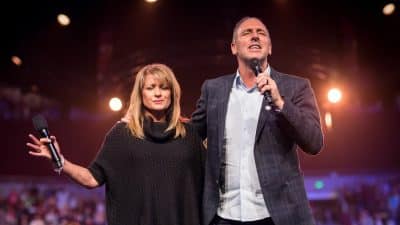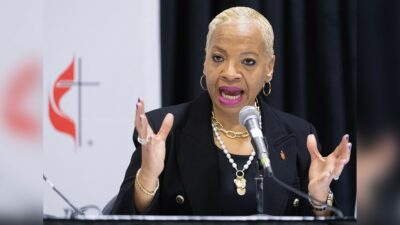Jesus once told a parable about two different people constructing houses. One built on a foundation of stone and the other on sand. When the rains came the house built on sand collapsed. The foundation was critical for a lasting home. In the parable, the foundation represented the words of Jesus and obeying them.
In a similar manner Hillsong Church was constructed on a foundation of sand.
Australian pastors Brian and Bobbie Houston founded Hillsong in Australia and launched a bold strategy to plant churches internationally.
In 2010, the legal structure for Hillsong in the United States was being constructed. Attorney Stephen Lentz, father of Carl Lentz who would become Hillsong’s most popular American pastor, drew up the articles of incorporation for Hillsong Ministries USA, Inc. and used language common to many televangelist churches’ governing documents. Stephen Lentz wrote in Article 6, “The Corporation shall have no members.”
These words started appearing frequently in church corporation documents in the 1990s. In 1994, before Joel Osteen became pastor, Lakewood Church restated its articles of incorporation with the words “The corporation elects to have no members.”
Your tax-deductible gift helps our journalists report the truth and hold Christian leaders and organizations accountable. Give a gift of $30 or more to The Roys Report this month, and you will receive a copy of “Hurt and Healed by the Church” by Ryan George. To donate, click here.
The churches of televangelists Mike Murdock, Eddie Long and Creflo Dollar also adopted similar language. Ironically, the bylaws of Grace Community Church, pastored by well known Hillsong critic John MacArthur, use the exact same words as Hillsong Ministries USA: “The Corporation shall have no members.”
As any objective onlooker can tell,@GraceComChurch and #Hillsong are more alike than different. https://t.co/0U75sswlnX
— Halloween Laur Nights (@laurchas22) April 1, 2022
This odd phrase prevents church attendees from being “corporate members”, which means that church attendees have no voting rights in the church. Instead, key decision making is restricted to the church board of directors or church elders.
Also in 2010, Hillsong’s New York City church was established. Jeffery Coombs, an attorney in Stephen Lentz’s law firm, drew up the articles of organization for Hillsong NYC, LLC. Hillsong began using limited liability companies (LLCs) to structure their churches.
Hillsong NYC’s governing document stated, “The limited liability company will be managed by one or more managers …”
Should the language of business define a church and how it operates?
In his book The Business of Church, Stephen Lentz explained the purpose of church LLCs.
“Because we live in a litigious society, it is important to isolate different initiatives that might have high risks. Its is first and foremost a containment strategy. We recommend using a single-member limited liability company (LLC) to isolate different church initiatives that are vital to the footprint of the church in its community. Each activity can be vigorously pursued without putting all of the assets of the church at risk.”
By following this strategy, Hillsong created LLCs to function as property holding companies operating independently of the churches. In Maricopa County, Arizona, home of Hillsong Phoenix and Hillsong University, PHX Property Holdings LLC owns 31 properties. However, most of these properties are smaller lots combined to create large church campuses.
Stephen Lentz failed to recognize the fatal flaw of church LLCs. There is little, if any, accountability provided for the managers.
The Same Name Game: Hillsong Phoenix
Some of Hillsong’s American churches operated as traditional incorporated non-profit organizations. In 2016, the tradename Hillsong Phoenix was registered to Citichurch International, Inc.
Citichurch included Australian Hillsong leaders Nabi Saleh and George Aghajanian on the church board of directors. How can board members living thousands of miles away provide proper oversight for a church?
In 2017, Hillsong Phoenix, LLC was registered in Texas. Therefore, two different organizations existing at the same time, used the name “Hillsong Phoenix.” Trinity Foundation describes this practice as The Same Name Game.
If a check was written out to Hillsong Phoenix, would the money go to Citichurch or the LLC registered in Texas?
What Are the Structures of ‘New’ Churches?
New allegations of misconduct by Hillsong founder Brian Houston have shaken Hillsong Church.
Critical media coverage from the Discovery+ documentary series Hillsong: A Megachurch Exposed have caused Hillsong pastors to question their ties to the Hillsong brand, resulting in several announcing they are leaving to start new churches. (Disclaimer: Trinity Foundation investigator Barry Bowen, the author of this article, appears in episode three of the documentary.)
Has Hillsong Church’s former pastors learned from their mistakes?
In February 2022, Hillsong Kansas City changed its name to Kingdom City Church. The church has two officers (president and secretary) and four additional board members. Only one of the six church leaders is from Kansas City. Again, how can people appearing to be scattered across the country provide proper oversight from a distance for a church?
Sam Collier resigned from his position as pastor of Hillsong Atlanta and has already filed articles of incorporation for Story Church, Inc. The articles of incorporation states, “The corporation will not have members.” Seriously?
Who will comprise the church board? No other names are listed in the church’s articles of incorporation. Who will hold Collier accountable?
*This article has been updated to clarify that the many lots owned by PHX Property Holdings LLC are smaller lots combined to make large campuses.
This article was originally published by Trinity Foundation.
Barry Bowen is a staff member of Trinity Foundation, a public nonprofit based in Dallas, Texas that has been tracking religious fraud and helping victims for over 30 years.




















25 Responses
“Stephen Lentz failed to recognize the fatal flaw of church LLCs. There is little, if any, accountability provided for the managers.”
It’s possible that, from Mr. Lentz’s point of view, this was “not a bug but a feature.” An attorney works for his client – the Houstons, I suppose, as well as his own son – not for the corporation’s hypothetical congregation.
I wonder if the author of this article has studied church polity — if not, he’d be shocked to discovery outside oversight is quite common. Throughout history, there have been many different ecclesial structures. The idea that churches have to be some sort of democracy is a very post enlightenment viewpoint. Of course, the question becomes who provides oversight in a post-denominational age. There needs to be oversight, but that oversight does not necessarily need to be vested in the local congregation. I’d argue power needs to be divided with some power vested outside to protect against mini-fiefdoms. Vesting the power at the local level can often lead to every bit as much abuse. Interestingly, Ted Haggard developed a hybrid model that worked quite well when he had his own fall.
Fred, as the author of this article, I’ve examined the articles of incorporation for more than 100 American megachurches, studied church polity and can list the different kinds of church governance. Hillsong’s use of LLCs is uncommon as a church legal structure. The Bible places more emphasis on the character of church leaders than on the corporate structure used. (Example: They must not be lovers of money. – 1 Timothy 3:3) Long distance oversight doesn’t work well. How can a church board member living hundreds of miles away provide proper oversight when they don’t know most of the congregation? By the way, it is common for elder run churches to avoid financial transparency. How can a church attendee know the church is paying excessive compensation if the church doesn’t disclose the pastor’s salary?
Hey Barry, the multiple LLCs seem odd — typically that’s used to shelter liability or to hide something. But, generally, my point is that local control is not superior to outside control. I think churches need an outside body (almost HR in nature) to adjudicate claims against leaders. Local power is often clouded by being too close to the situation. Haggard’s model (that Hodges and much of ARC have adopted) has three levels of oversight. A trustee board (legal/corporate), an elders board (for spiritual care) and an outside board to adjudicate charges (and sometimes comp).
Honestly I’ve seen the shared model work quiet well in post-denominational churches and be healthier when leaders fall than say Willow Creek’s situation. The model isn’t flawed, but potentially the people sitting on the outside board need to be less chummy with the leader. But, acting as if membership is the answer to the problem is a false flag.
I could discuss this all day. :) I care deeply about church legal structures as a way to protect people from pastors and pastors from the people. I’ve seen democracy severely abused by strong forces bent on keeping a pastor from making needed reforms and firing abusive employees.
P.S. I miss the Whittenburg door.
Appreciate your reply. Thank you
Excellent article. Hope this can force churches to change
Would love to know how to check this for my local churches, maybe include a, “how do we find this out” section?
“Membership” in an Elder-Rule church like GCC is a misnomer.
The appropriate use of the word “membership” describes a status within a group that gives one the right to receive goods and services from the group or to exercise influence in the group.
When one signs a membership contract in an Elder-Rule church one does not receive any tangible benefit that one could not receive by simply attending.
So, why have a membership covenant in an Elder-Rule church if membership does not provide tangible benefits a member desires?
It is to get the member to agree to his own subjugation. Membership covenants in Elder-Rule churches emphasize submission to unaccountable leadership. Once you sign, you give them the right to exercise power over you.
Interesting comments, Paul.
I think the office elder is described in many places in the Bible, such as 1st Peter 5:1-11. The church wasn’t to be put under the rule of neophytes of the faith.
Term limits for elders and pastors, especially in mature churches, should be practiced! This would help solve some of the problems of entrenched leadership.
Jim, I’m curious about term limits. On one hand it would keep ministers from becoming too entrenched in a church; however, it might keep ministers with character and competency out of positions they should be in.
One thing I’ve noticed in MacArthur affiliated churches (and you’ll find it in most if not all evangelical churches) is an incredibly high view of pastors that often crosses into “vocational awe.” The basic idea is of a special person specially called by God. This makes it easier for the congregation to ignore healthy accountability structures for pastors.
I do think a job as a pastor is very important because a pastor will be asked to handle very sensitive issues and vulnerable people, but because of this I think pastors (and any type of counselor) should actually have higher standards and tougher accountability than those who don’t work with people in this way.
Paul, as much as I dislike using antidotal examples, but I at least had a very good example of pastor didn’t have any problem getting a new position. He spoke often in my home church. There is an example of forced retirement in the Old Testament priests–had to retire at 50 years of age. (Numbers 8:25). I don’t think the problem of pastors having to quit early – for good ones – but the problem for wanting to die in the pulpit and not being as mentally acute as they were before 70 years of age!
Terms of service should be reviewed every 5 years (just as an example) for elders and pastors before they are given extensions to their terms in those offices. On Roy reports I begin to see many examples where there should be a mandatory retirement age for pastors at 70 (!?)
All the conservative pastors I’ve been exposed to, did not graduate from Master’s seminary. They graduated from places like Moody (as an aside I would recommend Moody’s Bible Commentary and other works from Moody over those of John MacArthur’s!).
A wonderful example in an episcopal church of which I was a member (organic, not functional) was the rector (‘senior pastor’) decided that he would ‘step down’ due to his age. With the agreement of the bishop he did so, and the curate was then appointed as the rector with the due process of a ‘search committee’ nominated by the assembly of that local church. The ex-rector has since happily ministered with a lighter load, for the past decade, as the assistant to his ex-assistant.
One of the sad stories from the last month since the Eileen Gray story broke, is that of GCC members who resigned memberships at some point in the past, but the elders refused to release their membership until they checked for discipline cases against them. “Yeah we’ll release you once we make sure we don’t want to charge you with anything first…”
This kind of controlling behavior is extremely disturbing and spiritually abusive. I’m a believer in church membership but this 9-Marks style heavy handedness needs to end immediately. It’s coercive, controlling, and just plain cultish.
1 Timothy 5 V 19-21 reminds us that it is the duty of the Church body to “Reprove” elders that are erring. Matthew 18 v 15-17 shows the church body to be the higher authority in some church matters. The key role of a church leader is to serve. Too many, sadly, are self-serving and empire building and have become addicted to control and self promotion. I am speaking from a UK perspective. Fearless reporting of this culture is good. Thank you to our US Brothers and Sisters.
When Jesus said, “My sheep hear My voice”, He didn’t mean for it to be confusing. If the sheep are listening to these people, they bear some culpability.
Excellent article. Who is over a church is such an important consideration, and something of a dilemma for ” independent” congregations. I’d love to read an article on the other side of the equation. That is, how are those leaders -regardless of structure- selected.
Whether an elder board or corporate board, composing a group of term-limited members of a congregation, (ot primarily church staff)nominated and voted upon by members and not subject to pastoral veto review seem like basic safeguards that are lacking in so many congregations.
I recently came into contact with a congregation that just voted to give their pastor final approval of any board candidate, even before an election.
”Give us a king like the nations” indeed.
Good points, Karl. Kingships indeed.
Apparently, members, besides going to a new church of course that has greater financial responsibility then their church, can you see if their church will behave in responsible manner such as pointing out what their leadership gets in salary. I know Methodist churches years ago had no problem In reporting what there ministers annual salaries were. I suppose members who aren’t going to quit a church can do what the English parliament did with greedy kings–cut their financial support, if not their attendance!
I certainly wouldn’t be surprised if the Roys Report didn’t mention the following article at some time in the past, if not, here is the URL for it.
https://ministrywatch.com/the-masters-university-resigns-from-the-evangelical-council-for-financial-accountability/#
I find reasons in the article for not buying any more MacArthur’s writings.
Not sure the biblical pattern of the assembly is that of a business or a gameshow – Hillsong is one of many that fall short embracing this strategy. And we wonder why we’re losing the culture when church management (not leadership) facilitates entertained and comfortable drones instead of cultivating Christlike and significant disciples.
This article touches an important point that is easily lost. Protection of the material assets of the church. But the protective vehicle (a corporation of some form) should be merely the servant of the organic body, not its ‘manager’. In my current church we are part of an association of churches; the association organised a legal trust to own all member churches’ properties, with the trustee to act under the direction of the governing body (board of deacons) of the local church. The trust arrangement has nothing to do with the life of the church. It just holds the property. It works well.
Jesus was very clear about the “structure” of His ONE BODY, His ONE BRIDE, His ONE FAMILY.
Obviously NONE of these IDENTITY markers have any hierarchy of people (you are all brothers), no pulpit and pew building for weekly Bible lectures reserved fro one hired man (Heb. 10:24-25), and no brand name dividing it from 1000 other brand names who can’t fellowship much together due to micro differences of opinions of men.
The structure was being corrupted in Corinth, so Paul addressed it there and in EVERY epistle. But hired Bible experts ALL get it wrong because the paycheck, title, office of RESERVED ministries is ONLY found in INSTITUTION structures that have dominated for 2000 years. The Reformation did not clean up this HUGE pile of filth baked into church life. EVERY fellowship that is institutionalized in it’s function is equally as dirty based on God’s standard of obedience. I quoted and gave scripture. But ALL clergy, and laity who love this false division, have scripture to twist AND nullify these simple and clear instructions.
By the grace of God, He can work DESPITE the filth, but He IS going to clean it ALL up, either by helping saints learn to obey the truth or by pruning some wealth out of their pockets so they can’t afford to pay for the corrupted stuff. 84% of giving on average is CONSUMED inside the church door by “normal church budgeting” averages.
“Setting Pastor Salaries and Pastor Compensation”
https://www.payscale.com/career-advice/setting-pastor/
Tim, I can’t agree with all your ideas on church structure, that says plenty of examples of church structure in the New Testament. The above article, which is 14 years old still has some good ideas on pastors’ salaries. Very interesting was the information on Joel Osteen’s and Rick Warren’s salaries!
A workman is worthy of his hire, and this means pastors should be given a living wage, and a church does have to have some sort of structure, unless you’re Hutterite according to the about article.
I believe pastors should have fair wages certainly, but you have to know what those wages are in the first place!
Thanks for your reply. All 4 passages clergy use to justify a pay check are ALL twisted including 1 Tim. 5:17-18 that you allude to. This passage says “those who labor in the word and teaching should be considered worthy of DOUBLE HONOR”, not a pay check. “Double honor” is literally double what ALL the rest of the saints are to give to each other. Clergyism has 3 ways to turn “double honor” into money”. ALL of them are twisted exposition.
1. You use one of the two double metaphors to change the literal meaning. Metaphors do not change the meaning, they teach, the expand on the literal meaning. Both the ox and the wages metaphor teach it is ESSENTIAL for “those who labor in the word and teaching” to receive literal “double honor”.
2. This is a quote from Jesus in Luke 10 and Matthew 10. BOTH places Jesus specifies “FOOD” not money.
3. In Matthew 10:8b, Jesus gave the economics of making disciples in 4 Greek words. “You received without paying , give without pay.” ESV. No money by the nature of the gospel – a free gift.
4. There is NOTHING in this passage or ANY passage that “teaching” is RESTRICTED to a 30-45 minute lecture and RESERVED for one man with a Bible degree. Col. 3:16 and others show it’s the OPPOSITE of this form specifically. Shared teaching by many is God’s design, not a focus on one man.
1 Tim. 5:17-18, 1 Cor. 9:4-15; Gal. 6:6, and Phil. 4:14-20 can also be EXPOSED as pure Bible twisting, for 500 years, by ALL hired Bible experts.
So Tim, what does 1 Timothy 5:18 mean since it is in the context of 1 Timothy 5:17?
Regarding #4 – Of course there is nothing in Scripture indicating how long a message and/or teaching is to be. Context and culture certainly play a part. But if there is a need to go 4 hours – that certainly is not prohibited.
Thanks for the “one another” dialogue.The two metaphors teach the SAME thing, even though one is about an ox and the other about an employee. It is ESSENTIAL to not muzzle an ox while treading AND it is ESSENTIAL to pay employees who work for the businessman. In the same way, it is ESSENTIAL to give “double honor” to those who “labor in the word and teaching.”
Clergy don’t want “double honor” turned into grain, they twist to get a “wage” from ONE of the metaphors. Metaphors DO NOT COMPLETELY ALTER the literal meaning of the statement they amplify. But clergy want the paycheck so they do it for 500 years and it appears godly. Repeat a lie often and it will seem true. Believer’s flesh enjoys spectating a lecture and calling it teaching even though NO ONE GRADUATES EVER. Luke 6:40 says real teaching graduates believers to be “fully trained to be like the teacher. That is graduation. Teaching RESERVED for one man is HOGGING that ministry. EVERY ministry is to be SHARED and REPRODUCED to others.
NOTHING in the Bible needs 30-45 minutes by ONE PERSON to be taught, much less 4 hours. Does it not make sense for ALL the gifts to SHARE in teaching so there is VARIETY and beauty IN the teaching rather than boredom when restricted to one brain and one gift? You have NEVER seen this VARIETY AND BEAUTY in truth expression so you think it’s impossible. God designed VARIETY by all, not EXPERTISE by one to be the POWER of truth expression.
Hi everyone, I’ve started reading some of the comments, but not all of them yet, so someone may have already answered my question.
I’ve started looking at GCC’s bylaws. I am interested in the subject because we are rewriting our church constitution at the moment and I also teach Ecclesiology in a small bible College in Western Europe.
Can someone explain to me how this works : on one page it says there are no members and the following page talks about church members ???